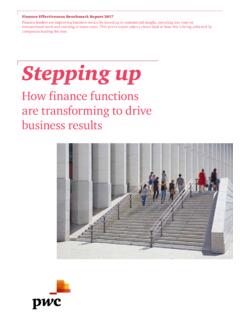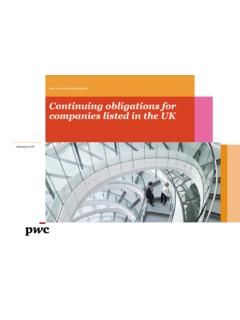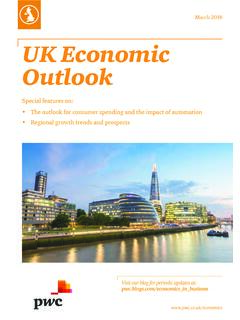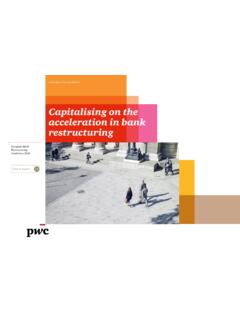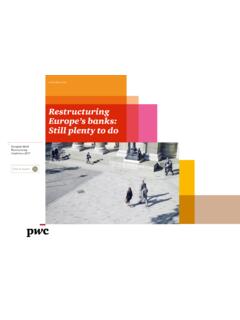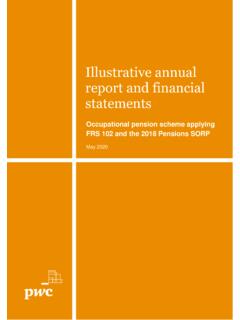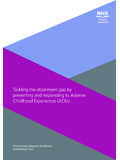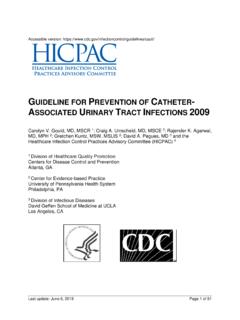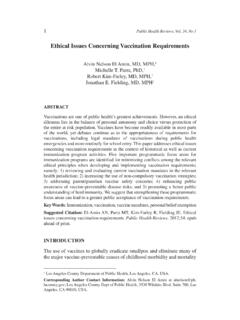Transcription of UK authorities finalise operational resilience approach
1 HighlightsIn the first 12 months, firms are required to map and scenario test to a level of sophistication necessary to accurately identify their important business services, set impact tolerances and identify any vulnerabilities in their operational resilience . The authorities have clarified that firms are not required to have performed the full mapping and testing exercises to the full extent of sophistication by 31 March Bank of England (BoE), Prudential Regulation Authority (PRA) and the Financial Conduct Authority (FCA) (together the supervisory authorities ) published their final policy and supervisory statements under the title operational resilience : impact tolerances for important business services on 29 March 2021. This concludes an extended period of engagement with the industry, starting from the 2018 discussion paper and followed by the 2019 consultation there are no fundamental changes to the approach there are some helpful clarifications to the application of the policies.
2 Firms and Financial Market Infrastructure providers (FMIs) (together referred to here as firms ) will want to understand how these changes may influence their current or planned messages Flexibility in applying the policies - the new policy statements are designed to give firmsflexibility and proportionality in applying the rules and guidance in a way which is appropriateto them, for example avoiding prescriptive taxonomies or tests. Transitional arrangements - as above the regulators have slightly softened theirexpectations in the implementation period up to 31 March 2022 Prevention vs response - the messaging highlights the importance of focusing on bothpreventing incidents wherever possible, as well as practising response activities for whenfailures happen. Industry collaboration: the regulators encourage collaboration to drive good practice andacknowledge that standards may emerge over time. COVID-19: recognition that while firms have demonstrated a good degree of resilience in2020, they need to prepare for other severe disruptions with different characteristics andwhich are firm figure below sets out the package of papers which have been published.
3 This paper focuses on the PRA and FCA approaches to operational TOPICM arch 2021 Financial Services Regulatory InsightsDuncan ScottT: +44 (0) 7894 393607E: StageT: +44 (0) 7483 422845E: authorities finalise operational resilience approachStella NunnT: +44 (0) 7932 144627E: IgbokoT: +44 (0) 7802 659045E: CounterpartiesCentral Security DepositoriesRecognised Payment System Operators and Specified Service ProvidersPS 6/21 PRA RulebookSS 1/21 SoPPS 21/3PS 7/21SS 2/21 operational resilience : Impact tolerances for important business servicesCover paper summarising the approach and key changes post consultationOutsourcing and third party risk managementBank of EnglandObjective: financial stabilityPrudential Regulation AuthoritySafety and soundness; policyholder protection; and competitionFinancial Conduct AuthorityConsumer protection, market integrity and competitionKey PS = Policy Statement SS = Supervisory Statement SoP = Statement of Policy All boxes contain hyperlinksContextThe overall regulatory approach on operational resilience remains largely unchanged.
4 operational resilience refers to the ability of firms and the financial sector as a whole to prevent, adapt, respond to, recover from, and learn from operational disruptions. An operationally resilient firm is considered one which, per the consultation papers:Prioritises the things that matter: by understanding the services it delivers to an external end user or participant and determining which are the most important given the propensity to pose an intolerable risk to the regulators objectives. The firm should also understand the critical dependencies to deliver the clear standards for operational resilience : by defining the maximum tolerable level of disruption to an important business service, expressed by reference to specific outcomes and to build resilience : by testing its ability to remain within its impact tolerances and identifying where vulnerabilities need to be addressed, while being prepared to invest to build of application The scope of the new policies remain largely as suggested in the consultation papers, namely:FCA: banks, building societies, designated investment firms, insurers, Recognised Investment Exchanges (RIEs), enhanced scope senior managers and certification regime (SM&CR) firms, and entities authorised or registered under the Payment Services Regulations 2017 or the Electronic Money Regulations.
5 UK banks, building societies, PRA-designated investment firms (banks), UK Solvency II firms, the Society of Lloyd s and its managing agents (insurers).BoE: central Counterparties; Recognised Payment System Operators and Specified Service Providers; central Securities supervisory authorities expect those firms not subject to the new policy to meet their existing operational resilience points of interestClarification that third country branches are not in scope for the new policy areas but existing FCA and PRA rules apply, some of which are relevant. Payment firms which also carry out FSMA regulated activities will also be pleased to see that they do not need to include those activities if they would not be in scope on a standalone business servicesFirms should follow the definitions of important business services (IBS) as set out by the FCA and PRA respectively, namely: FCA: IBS means a service provided by a firm, or byanother person on behalf of the firm, to one or more clientsof the firm which, if disrupted, could: (1) cause intolerablelevels of harm to any one or more of the firm s clients; or(2)pose a risk to the soundness, stability or resilience ofthe UK financial system or the orderly operation of thefinancial markets.
6 PRA: IBS means a service provided by a firm, or byanother person on behalf of the firm, to another personwhich, if disrupted, could pose a risk to: (1) (where thefirm is an O-SII/where the firm is a relevant Solvency IIfirm) the stability of the UK financial system; (2) the firm ssafety and soundness; or (3) (for Solvency II firms) anappropriate degree of protection for those who are or maybecome the firm s considerations in identifying IBS All (in scope) firms will have at least one importantbusiness service that may impact the firm s safety andsoundness. The FCA and PRA have set out minimum factors for firmsto consider in identifying important business these do not preclude the use of additional factors,such factors should not reduce the list of IBS. Firms are required to identify important business servicesat least annually, and after a material change to thebusiness ( starting / stopping an activity , starting anew outsourcing arrangement, or changes to the existingservice in terms of scale or potential impact.)
7 Business services should be articulated at a level ofgranularity which enables an impact tolerance to beapplied and which supports management bodies inmaking prioritisation and investment decisions. Where a firm is a member of a group it is expected toidentify a proportionate number of important groupbusiness servicesNew points of interestIBS for dual-regulated firms: the joint cover paper indicates that a business service may only be important for one regulator if it does not meet definitions for both PRA and clarification on internal services: While some examples have been previously cited as out of scope, payroll, other examples have been introduced as they support business services and are not customer-facing, settlement or treasury services. Impact on financial stability: the PRA has narrowed the requirement for firms to consider financial stability in identifying IBS and setting impact tolerances to only those firms identified as other systemically important institutions (O-SIIs) and insurers with gross written premiums exceeding 10 billion or technical provisions exceeding 75 billion, both on a three-year rolling and operational resilience : the PRA distinguishes important business services, from critical (and essential) services for OCIR which are likely to form a more comprehensive set of internal and external provided services that must continue during the process of resolution from stress to post-resolution restructuring.
8 We have recently published a practical guide to how OCIR and resilience PwC publications on important business servicesDefining business servicesResilience and resolutionOther PwC publications on impact tolerancesMapping A firm must identify and document the necessary people,processes, technology, facilities and information (referredto as resources) required to deliver each of its IBS. Thisincludes where third parties provide the resources. Firms should map the IBS with the aim of: identifying andremedying vulnerabilities; and enabling firms to conductscenario testing. It is expected that IBS maps are updated as a minimum atleast once a year or after a material change to points of interestImplementation period: of most significance is the slight softening of requirements in year one of the implementation period, with firms no longer expected to have performed mapping and scenario testing to the full extent of sophistication by 31 March 2022.
9 See the final page for more information on the in approach : mapping approach is expected to vary between IBS and between firms based on the different requirements to meet the policy and sign-off: it is expected that the Board, or equivalent management body, approves the mapping tolerancesFirms should follow the definitions of impact tolerances as set out by the FCA and PRA respectively, namely: FCA: impact tolerances means the maximum tolerable level of disruption to an important business service, as measured by a length of time in addition to any other relevant metrics, reflecting the point at which any further disruption to the important business service could cause intolerable harm to any one or more of the firm s clients or pose a risk to the soundness, stability, or resilience of the UK financial system or the orderly operation of the financial markets. PRA: impact tolerances means the maximum tolerable level of disruption to an important business service or an important group business service as measured by a length of time in addition to any other relevant considerations in setting impact tolerances Firms should set a tolerance for disruption for eachimportant business service.
10 It is mandatory for impact tolerances to be set using time /duration metrics, but they can also be supplemented withadditional metrics. This is particularly appropriate whereIBS can continue to run at a percentage capacity of its fullcapability for a period of time. An impact tolerance should relate to a single disruption,rather than an aggregation of a number of disruptions. Dual-regulated firms will be expected to set and manageup to two impact tolerances for each of their importantbusiness services: one at the first point at which there isan intolerable level of harm to consumers or marketintegrity (FCA), and another at the first point at whichfinancial stability (excluding small and medium-sizedfirms), a firm s safety and soundness, or policyholderprotection is is put at risk (BoE/PRA).How to set and test impact tolerances Firms are required to set impact tolerances at leastannually Firms retain the responsibility to ensure they can remainwithin impact tolerances regardless of whether or not ituses third parties for the provision of an points of interestFCA definition of intolerable harm: the FCA sees intolerable harm as something from which consumers cannot easily recover, where a firm is unable to put a client back into a correct financial position, post-disruption, or where there have been serious non-financial impacts that cannot be effectively remedied.
